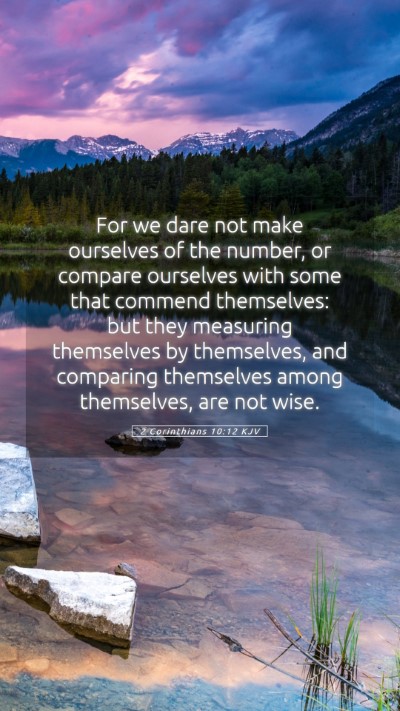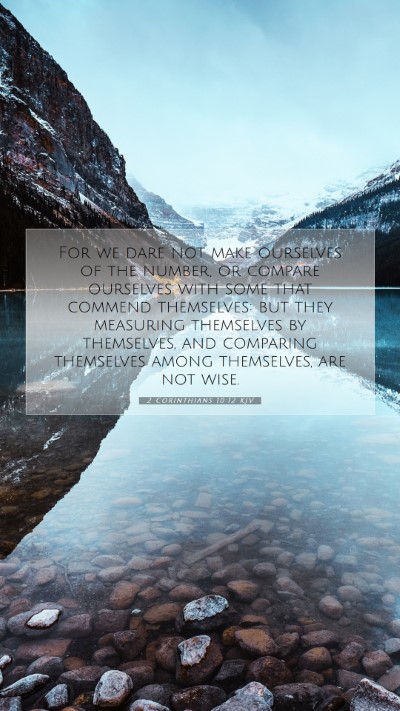Understanding 2 Corinthians 10:12
Bible Verse: 2 Corinthians 10:12
"For we dare not make ourselves of the number, or compare ourselves with some that commend themselves: but they measuring themselves by themselves, and comparing themselves among themselves, are not wise."
Bible Verse Meaning
This verse, taken from Paul's second epistle to the Corinthians, highlights a critical aspect of self-evaluation and the pitfalls of human comparison. The Apostle Paul conveys that true wisdom does not come from comparing ourselves to one another, especially when such comparisons are made among those who inflate their own worth.
Insights from Public Domain Commentaries
-
Matthew Henry's Commentary:
Henry emphasizes the folly of self-commendation. He notes that those who commend themselves do so to draw attention to their own merit, which can create a false sense of superiority. This type of self-evaluation leads one away from true standards of judgment, which should come from God's perspective, not from one’s own fleshly comparisons.
-
Albert Barnes' Notes:
Barnes elaborates on the idea of not making “ourselves of the number.” He interprets this as Paul asserting that true leaders in the faith do not regard themselves based on plush titles or self-promotion. Instead, they recognize the importance of God’s evaluation over human accolades, understanding that comparing oneself with others is inherently flawed.
-
Adam Clarke's Commentary:
Clarke points out the absurdity of relying on one's own standards for worth, which can lead to both pride and despair. He further explains that such comparisons lack wisdom and are ultimately meaningless in the light of God’s expectation for humility and genuine faith.
Key Themes and Concepts
Several themes arise from this verse that deepen our Bible verse understanding:
- Self-Examination: The need for true self-assessment grounded in God's Word rather than superficial comparisons.
- Humility: Promoting the importance of humility in leadership and personal conduct, avoiding arrogance that might result from self-promotion.
- Wisdom in Comparison: Understanding that wisdom is found in God’s judgment, not in human assessment systems.
- Spiritual Integrity: Maintaining fidelity to the mission of Christ without succumbing to jealousy or rivalry.
Application in Daily Life
This scripture challenges us to apply its truths directly to our lives. In a world increasingly focused on status and success, we are invited to ask questions like:
- How often do I find myself comparing my journey to others?
- What standards do I use to measure my achievements?
- Am I aware of God’s evaluation of my life, and do I prioritize it over worldly measures of success?
Further Cross-References
For additional understanding using Bible study tools, you may consider the following related scriptures:
- Galatians 6:4: "But let every man prove his own work, and then shall he have rejoicing in himself alone, and not in another."
- Proverbs 21:2: "Every way of a man is right in his own eyes: but the Lord pondereth the hearts."
- Romans 12:3: "For I say, through the grace given unto me, to every man that is among you, not to think of himself more highly than he ought to think; but to think soberly, according as God hath dealt to every man the measure of faith."
Conclusion
In understanding 2 Corinthians 10:12, it becomes clear that true wisdom lies in recognizing our identity and value through God, rather than by engaging in comparisons that serve no purpose. This verse encourages believers to uphold integrity, humility, and a focus on God’s approval in all pursuits, leading to a more profound and meaningful spiritual life.


